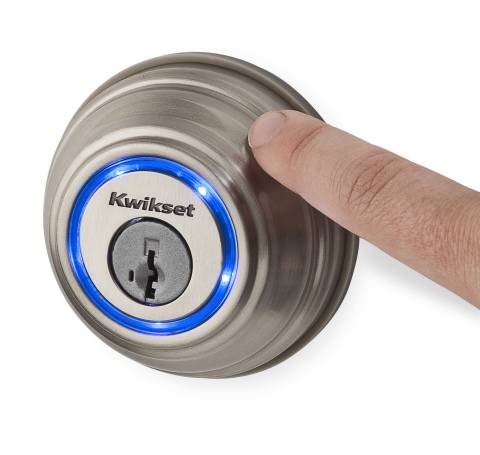
It is looking like Android users may soon have another option when it comes to ditching the front-door key. Kwikset has announced that pre-orders are beginning today (July 30th) for the Kevo deadbolt. This is a Bluetooth-enabled deadbolt and it brings the promise of being “intelligent enough to communicate with a smartphone and unlock with a simple touch.”
To that point, Kwikset touts the Kevo deadbolt as being able to allow the user to unlock their front door without even having to take their smartphone out of their pocket. The setup works with Bluetooth 4.0 LE technology and pairs with an app running on your smartphone. The Android app is said to currently be “underway.” Kwikset has yet to say when the app would be ready, however the deadbolt isn’t expected to ship for a few months time.
The pre-orders are available with several retailers including Amazon and Newegg as well as Home Depot and Build.com. The pre-orders all point towards shipping at the end of October, however Kwikset notes a shipping estimate of some time in September. The deadbolt will set you back $219.
The Kevo deadbolt is available in three finishes; Satin Nickel, Venetian Bronze and Polished Brass. The deadbolt runs on four (included) AA batteries and ships with the deadbolt itself as well as one fob, two regular mechanical keys and two eKeys for your smartphone. Well, technically those eKeys will have to be downloaded separately. Otherwise, Kwikset has said those AA batteries should last for up to one year.
Using this setup seems simply enough, the lock catches the signal from your phone (or fob) and you then just have to touch the lock with a finger to trigger it. Aside from ease of entry for you, this setup also allows you to send an eKey to others. This assumes that other person has a capable smartphone, however it could mean you can easily allow someone to enter your house even if you are not around.
VIA: Engadget
SOURCE: Business Wire










so what if your INSIDE the house, within range of the door and someone outside touches it? will it open?
According to Amazon it uses “Positioning Technology” to tell whether you’re outside or inside to prevent this happening.
sheesh, i wouldn’t trust that crap. nextttt
Yeah, nice job asking a question and then completely disregarding a legitimate response to said question. People like you are the reason we haven’t colonized Mars already. Too damn closed-minded.
and it’s people like you that don’t use common sense to see I wasn’t disregarding the answer. I was saying like dam, that sucks then I wouldn’t trust it, next device….
Amazon says this is only compatible with iPhone. I was pretty sure they had intended to make it available to Android the last time I read about it.
This seems a bit shady. what if its batteries die? Why do i want an app running in the background on my phone all the time just so i can unlock my door without keys?
I believe this uses bluetooth SMART (also known as bluetooth LE), a low-power version of bluetooth specially designed for this kind of purpose. I do not believe it requires an app to always be running, but is instead handled by the phone’s OS, launching the app and passing control to it once it detects the presence of the lock.
If the batteries die just use the mechanical keys.
isn’t the point to not have to carry your keys?
I think the point is more to do away with the hassle of needing to get keys, most of the time. You can just tap with a nearby authenticated phone. Still carry your keys, in case you don’t have your phone or something, but as long as you usually have the phone on it enables a shortcut.
It will send many low battery alerts when batteries start getting low. If the batteries die, that is your fault.
What? I wouldn’t trust this. Why not just use NFC and maybe have the reader be lower like around your pocket height. First of all, it’s a lot safer as you have to be really close to the device, and it will use less battery (on both the device and phone). Neither is as secure as a hardware key, but ay we’re aiming for convenience here.
The KwikSet locks are known to be unlocked with nothing more than a screw driver and hammer, the bluetooth means nothing if the lock is worthless.
If someone wants in that badly they’ll simply kick the door in, or pick the lock, or break a window. Locks such as this simply slightly increase the difficulty of entry to dissuade casual unauthorized entry. It’s not worthless; it’s doing exactly what it’s intended to do.